
Perfect Group has begun construction of the Velmy apart-hotel in Polianytsia, Ivano-Frankivsk region, the company’s press service told Interfax-Ukraine.
According to Oleksiy Koval, project manager at Perfect Group, the goal of the Velmy project is to change the standards of recreation and investment in the region.
“We create a space for emotions and memories, where every detail works for the comfort of our guests. In addition, it is a reliable investment with a projected payback of eight to nine years, which makes the project attractive to investors. We believe that Velmy will become a landmark in Bukovel,” Koval said.
The Velmy apart-hotel is located in Bukovel next to Lake Molodist and ski lifts #14 and #22. It has 492 apartments ranging from 26 to 80 square meters. The complex is positioned as a business class, with a panoramic swimming pool, Ski-in/Ski-out, SPA center, gym, restaurants, conference hall and children’s center among the offered infrastructure.
Investors are offered refurbished apartments, while transactions are formalized in accordance with the new legislation on future real estate objects (BON) with registration of special property rights (SPR) in state registers.
The first phase is expected to be commissioned in the third quarter of 2026. Currently, the price per square meter starts from UAH 167.9 thousand. There is an installment plan with a down payment of 50%. The tourist season at Velmy is expected to be year-round, with a likely rental yield of up to 12% per annum and a payback period of eight to nine years.
Founded in 1991, Perfect Group has commissioned 42 buildings since 2010, with 21 buildings under construction.
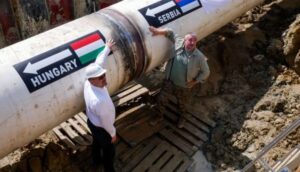
Hungarian Foreign Minister Peter Szijjarto and Serbian Energy Minister Dubravka Jedovic-Handanovic agreed on Wednesday to intensify investment policy in the energy security sector and speed up the construction of the first oil pipeline between the two countries, the Hungarian foreign minister said.
“We have agreed to expand joint investments in energy and energy security, including the construction of the first interconnecting oil pipeline,” Szijjarto wrote on Facebook (Meta Platforms Inc.).
In addition, Sijarto and Jedovic-Handanovic agreed to step up funding for “a new power line connecting the networks of the two countries.”
“For our country, Serbia is a strategic partner, without Serbia there will be no energy security for Hungary, and vice versa,” the Hungarian Foreign Minister added.
As reported, the construction of the oil pipeline between Hungary and Serbia is expected to be completed by 2026. The new branch will be connected to the Druzhba pipeline and will allow Serbia to diversify its oil supplies and not depend on Croatia.
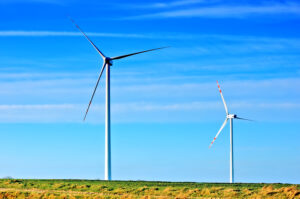
On December 20, 2024, the International Finance Corporation (IFC) of the World Bank Group signed documents to provide a $53.87 million loan to Concern Galnaftogaz to finance the construction of a 147 MW wind farm in Volyn region and technical support.
According to the IFC website, the total cost of the project is estimated at EUR261 million (including VAT), with a 16-year loan provided to the established project companies Wind Power G&I Volyn LLC and Wind Power G&I Volyn 3 LLC, controlled by GNG Retail Limited and its subsidiary Concern Galnaftogaz (together – GNG Group).
It is noted that the project involves the attraction of mixed financing, in particular from the UK-FCDO and EC-UIF, as well as the Clean Technology Fund.
Earlier, on December 4, participation in the project was also approved by the European Bank for Reconstruction and Development (EBRD), which has also already signed documents to provide the above-mentioned LLCs with a long-term loan of EUR 60 million for the construction of a 147 MW wind farm in the Volyn region.
The wind farm is expected to produce about 380 GWh (380 million kWh) of renewable electricity with zero carbon emissions annually.
In February 2024, the Antimonopoly Committee of Ukraine (AMCU) allowed GNG Retail Limited (Cyprus) to buy more than 50% of the authorized capital of Wind Power G&I Volyn LLC and Wind Power G&I Volyn 3 LLC. According to open registers, GNG Retail Limited owns 89.5% of the two LLCs, and JSC ZNVKIF Rimini (in which Vitaliy Antonov owns 83.19%) owns 10.5%.
OKKO CEO Vasyl Danyliak announced the start of construction of a wind farm in Volyn region in the fall of 2024. He explained the group’s plans to work in the renewable energy sector by the need to diversify its business, as the fuel market no longer foresees growth.
“Galnaftogaz operates one of the largest networks of OKKO filling stations, which includes more than 400 complexes with a network of catering facilities. The group also includes other businesses.
Vitaly Antonov’s GNG Retail Limited owns 90.25% of Concern Galnaftogaz shares. In October 2024, Avalia Investments Limited (Cyprus) of the founder and chairman of Concorde Capital, Igor Mazepa, became the owner of another 7.35% of the shares.
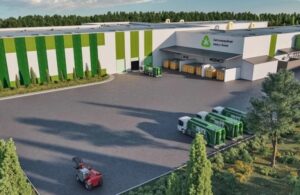
State-owned Oschadbank (Kyiv) has entered into a 5-year loan agreement with the Lviv City Council for UAH 840 million, of which UAH 718 million will be used to complete the construction of a waste processing plant.
According to the bank’s press release, the rest of the funds will be used to implement four more projects: the construction of an alternative bridge on Kovcha Street, the arrangement of two centers for veterans, and the reconstruction of the power supply system of the Pivnichna shopping center (CHP-2).
“Despite the fact that Oschadbank’s share in financing municipalities is more than 60% of the market, this loan agreement is the first in our cooperation with the Lviv City Council during a full-scale war. As a conscious bank that adheres to ESG principles, we are pleased to participate in the implementation of such an important environmental project for one of the most European cities in the country,” said Yuriy Katsiyon, Deputy Chairman of the Board of the state-owned bank in charge of corporate business, as quoted in a press release on Friday.
In turn, the Lviv City Council’s website states that the volume of construction work at the facility has reached 70%.
According to the release, once launched, the municipal waste recycling facility will be able to process more than 250 thousand tons of waste per year using mechanical and biological methods. This volume is expected to fully meet the city’s solid waste disposal needs.
The Oschad press service added that the Lviv Waste Recycling Plant construction project is also being implemented with the financial support of the European Bank for Reconstruction and Development (EBRD) and the Eastern European Energy Efficiency and Environment Partnership (E5P). The waste processing plant covers an area of 9.66 hectares.
The Lviv City Council website specifies that UAH 46.2 million of the total amount of approved funding will be used to build an alternative bridge on Omelyana Kovcha Street, and the remaining UAH 75.8 million will be used to equip two centers for veterans and reconstruct the power supply system of the Pivnichna shopping center (CHP-2).
According to the National Bank of Ukraine (NBU), as of November 1, 2024, Oschadbank ranked 2nd (UAH 340.77 billion) among 62 banks in the country in terms of total assets. The financial institution earned UAH 12.78 billion in net profit for 10 months of this year, compared to UAH 14.58 billion in the same period last year.
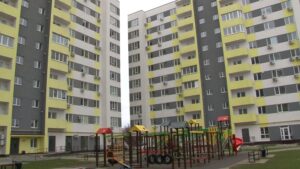
The European Investment Bank (EIB) is considering providing EUR 400 million in financing for a pilot project to build social housing in Ukraine, the press service of the Institute for Economic Research and Policy Consulting (IER) reports.
“Negotiations are currently underway to provide EUR 400 million in funding, which will consist of a grant and a loan for the construction of public housing. This should be housing in normally built-up parts of the city, with access to technical and social infrastructure,” said Grzegorz Gajda, Senior Sector Economist at the EIB, as quoted in the press release.
He noted that the housing should be built using the best European practices, in accordance with energy-efficient standards and the principle of build-back-better.
The project envisages the construction of about 6-6.5 thousand apartments. The EIB will select areas for social housing construction based on the needs of the regions and their interest in cooperation.
Along with this, the conditions for renting housing are being discussed. In particular, it is proposed to allocate social housing to employed Ukrainians with a salary not lower than the average, as well as to give local authorities the opportunity to transfer 20-30% of apartments for rent to people selected according to their own criteria, taking into account the professionals needed in the region.
According to the expert, the project also envisages finding opportunities for the social housing sector to independently finance its operations and maintenance to avoid the need for state funding for housing maintenance.
As the IER points out, at the beginning of 2022, there were only 3 thousand social apartments in Ukraine, while the number of internally displaced persons (IDPs) at the end of the year amounted to more than 5 million people. According to the International Organization for Migration, there are about 3.6 million internally displaced persons in Ukraine as of October 2024.
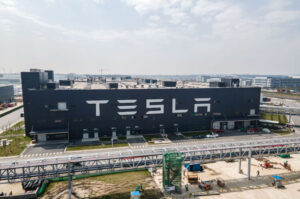
American electric vehicle manufacturer Tesla plans to complete the construction of a plant in Shanghai to produce Megapack energy storage devices by the end of this year, Xinhua news agency reported, citing a statement from the company’s local office.
Construction of the plant began in late May. The plant covers an area of about 200 thousand square meters, and the total investment in this project is estimated at about 1.45 billion yuan ($202 million).
The facility will be Tesla’s first energy storage project outside the United States and the company’s second plant in Shanghai after the electric vehicle gigafactory, with total investments exceeding 50 billion yuan.
Mass production of Megapack at the new facility is expected to begin in the first quarter of 2025. At the initial stage, the production volume will be 10 thousand drives per year, which is equivalent to approximately 40 GWh of electricity.
Megapack is a 3.9 MWh battery for energy storage and power supply support, its use contributes to the stability of power grids and prevents interruptions in their operation, according to Tesla’s website. The American company already has a Megapack production plant in California with a capacity of 10 thousand units per year.